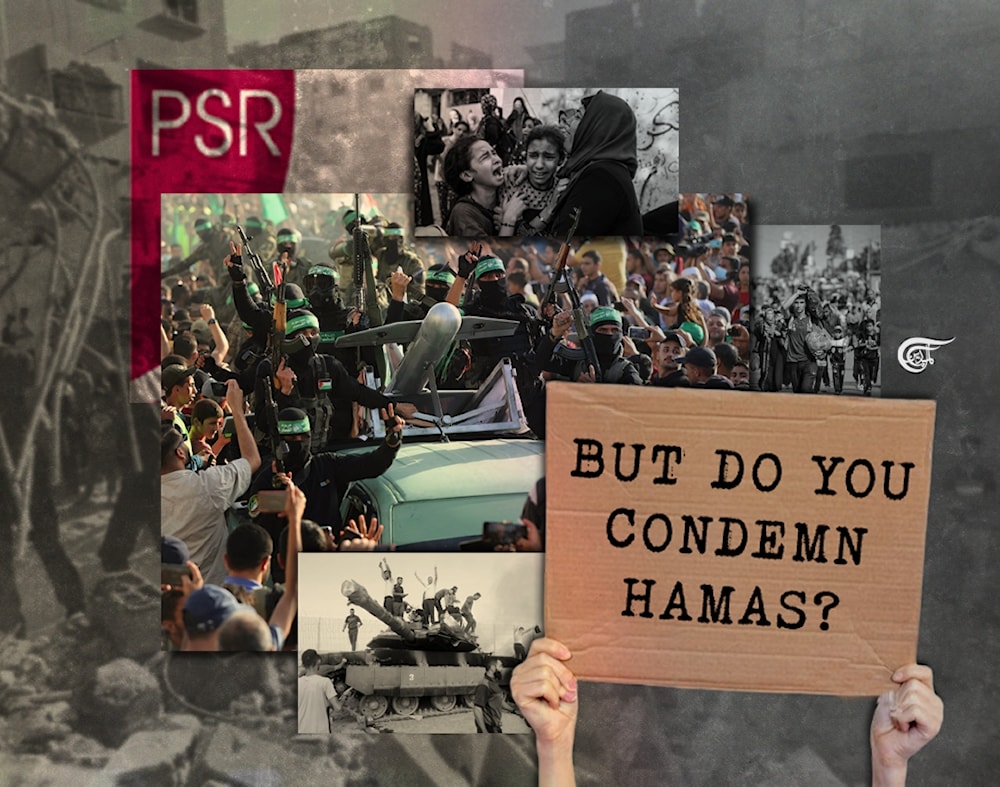PCPSR Poll: Resistance and liberation are the popular demands
The results of this PCPSR poll can tell us a lot about the unity of Palestinians in the face of colonialism, while also highlighting that Palestinian society is not a monolith and supports different factions and parties, just like in any other country.
-

Some of the key findings of these polls show an uptick in support for Hamas as a movement, and a sharp decline in support for the Palestinian Authority. (Al Mayadeen English; Illustrated by Zeinab El-Hajj)
On December 13, the Palestinian Center for Policy and Survey Research (PCPSR) released the results from a poll taken across Palestine between November 22 and December 2 regarding Operation Al-Aqsa Flood, the ensuing Israeli aggression, and Palestinian liberation operations. Some of the key findings of these polls show an uptick in support for Hamas as a movement, and a sharp decline in support for the Palestinian Authority, Mahmoud Abbas, and PM Mohammad Shtayyeh.
Regarding individuals in Hamas, there has been growing support for Ismail Haniyeh and Yahya Sinwar as leaders. Polls indicating strong support for armed struggle and popular resistance have seen an upward trend. The main findings of this polling can help us understand the pulse on the ground, and dispel narratives coming from the entire political spectrum of the West regarding our noble Resistance and what Palestinians ‘should’ do moving forward.
To begin, it is critical to understand the Palestinians’ feelings towards Operation Al-Aqsa Flood and their understanding of the reasons, timing, and goals. In the West Bank, 82% of respondents believed that Hamas was correct to launch this operation, even given the carnage. “Israel” has unleashed in the past two months since.
In Gaza, 57% of respondents feel the same way, that Hamas was correct in carrying out this operation on October 7, thus the statistical average shows that roughly 3/4 of the Palestinian society supports Hamas in military operations against the Zionists. The lower number of supporters in Gaza can be attributed to a number of factors: difficulty in getting respondents with a total IT blackout and the blockade, the residents of Gaza bearing the brunt of Zionist aggression, or respondents being dissatisfied with Hamas’s limited capacity in offering meaningful government support during 18 years of blockade. Another crucial finding is that the consensus (95% of those polled) in Palestine seems to be that “Israel” has committed endless war crimes from October onward, while also believing that Hamas has not committed any war crimes against “Israeli” civilians (90% of those polled). These feelings are backed up by admissions from the Zionist military that an “immense and complex quantity” of friendly fire occurred on October 7. The central point persists that a substantial majority of Palestinians express strong support for Operation Al-Aqsa Flood. Next, we can examine Palestinians’ opinions on the nature of the operation and what motives lie behind it.
When questioned about the motives behind Operation Al-Aqsa Flood, Palestinians overwhelmingly express support for and believe in Hamas' position. First, this operation was undertaken to secure the release of Palestinian prisoners from Israeli detention and to end the violation of worshippers, especially women, at al-Aqsa Mosque. According to researchers:
The respondents were asked to speculate on the motives behind Hamas' October 7 offensive: whether it was a response to attacks on al-Aqsa Mosque and to release prisoners, as claimed by Hamas, or if it was perceived as an Iranian plot to thwart Arab normalization with "Israel". The overwhelming majority (81%; 89% in the West Bank and 69% in the Gaza Strip) said it was a “response to settler attacks on al-Aqsa Mosque and on Palestinian citizens, and for the release of prisoners from Israeli prisons,” while only 14%...thought it was an Iranian plot.
The speculations that the Palestinian Resistance factions are dutiful puppets of Iran, or agents of an alleged ‘Iranian sub-imperialism’ are not new. This idea is mainly peddled by left standard bearers of Zionism and Arabs who feel resentment towards the rise of Iran since the Islamic revolution in 1979. It is crucial to reflect on the lessons from martyr Nizar Banat, who stood against this uninformed, anti-Iranian stance.
Banat emphasized that certain segments of Palestinian society exhibit a double standard or contradictory positions; on the one hand, they cheer on the rockets aimed at the colonial occupation forces and on the other hand they condemn Iran. Banat asks the simple question: “Where did you get the rockets that protected Gaza [from]?”. Another, more religious segment of society argues that Iran cynically exploits the Palestinian cause to spread Shia Islam, to which Banat responds “If so, why would [Iran] bother with 42 years of sanctions?”.
The important takeaways from this segment of the polling are twofold. One, that Palestinian society is not a monolith, and in fact contains classes, factions, reformists, and revolutionaries. Secondly, 41% of Gazans and 30% of those polled in the West Bank have favorable views of Iran. While the majority of Palestinians understand that Operation Al-Aqsa Flood was not orchestrated by Iran, it is critical to dispel incorrect ideas as they arise. The next segment of the polls which provides key findings is the section on the next steps.
Regarding the next steps and the internal political texture of Gaza and Palestine more broadly, Palestinians have made it clear that the Abbas-Shtayyeh clique in the PA needs to go, and that Hamas should continue to govern Gaza. This segment of the poll contains two separate questions: firstly, what Palestinians think will happen after this battle ends, and secondly, what Palestinians want to happen after this battle ends.
With regards to the first question, 64% of Palestinians believe that Hamas will continue to govern the Gaza Strip, while only 11% believe that a Palestinian unity government without Abbas will govern Gaza. Meanwhile, 60% of respondents want Hamas to continue governing Gaza while 16% across the West Bank and Gaza would like a unity government. In the figures specific to Gaza, 23% want a unity government which highlights the desire for reconnection with the rest of Palestine after almost 20 years of isolation and blockade. On this note of government division between Hamas and the PA, 88% of Palestinians would like to see Mahmoud Abbas step down as leader of the PA, and when asked to choose between Ismail Haniyeh, Mahmoud Abbas, and Marwan Barghouti in a hypothetical election, 47% would choose Barghouti, 43% Haniyeh, and only 7% Abbas. What remains clear is that Palestinians are fed up with the collaborationist, comprador leadership of the PA embodied by Abbas and Shtayyeh.
On the question of armed struggle, Palestinians are quite united as well. According to PCPSR:
When asked about the best way to end occupation and establish an independent state, the public was divided into three groups: a majority of 63% (68% in the West Bank and 56% in the Gaza Strip) said it was armed struggle; 20% said it was negotiations; and 13% said it was popular non-violent Resistance.
Historically, during the first and second intifada, armed struggle and popular non-violent resistance have gone hand-in-hand. Strikes, teach-ins, boycotts, self-sufficiency, and demonstrations attempted to break dependence on the Zionist colony, while armed cells conducted operations against the IOF.
Stories of popular resistance in Al-Walajah told by martyr Bassel Al Araj remind us that without the popular cradle and ingenuity of the Palestinian people, the armed struggle would have no base. The increase in support for armed struggle in the West Bank reflects the dialectical reality on the ground. On the one hand, the collaborationist PA police force harasses citizens on behalf of the occupation, while on the other hand, groups like the Jenin brigades and Lions' Den have grown qualitatively and quantitatively out of this repression.
In conclusion, the results of the PCPSR polling can tell us a lot about the unity of Palestinians in the face of colonialism, while also highlighting that Palestinian society is not a monolith and supports different factions, parties, and states just as the people of any other country. The armed struggle and popular Resistance, if taken together, remain the path towards liberation. With this in mind, it is easy to understand and support the position of PIJ’s representative in Iran that there will be no ceasefire until every Palestinian is liberated from the Zionist dungeons. A Luta Continua!

 Hanna Eid
Hanna Eid
 8 Min Read
8 Min Read











